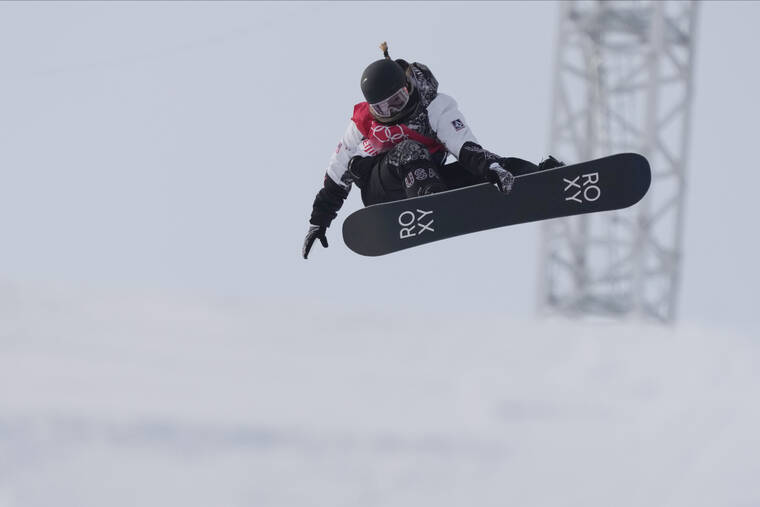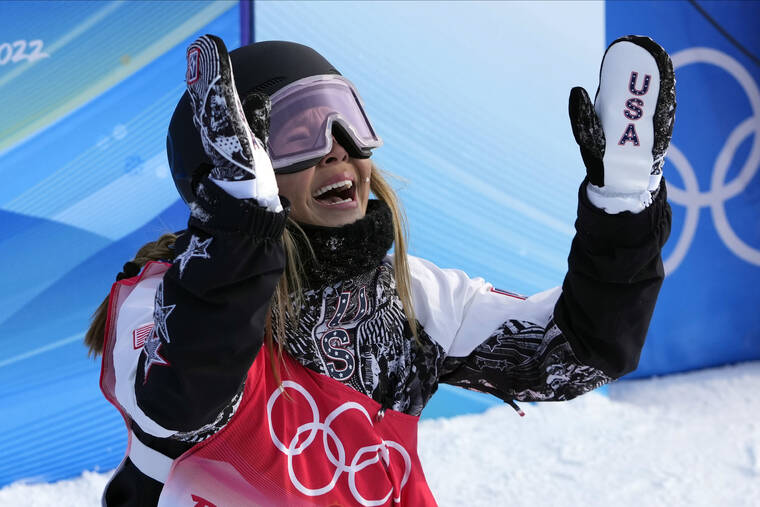Kim rides big 1st run to defense of Olympic halfpipe title
ZHANGJIAKOU, China — No way was snowboarder Chloe Kim taking an easy ride down the halfpipe for her victory lap on her third and final run.
Not with the perfect stage — and the pressure off — to see if she could land one of her toughest tricks, a cab 1260 (3 1/2 spins).
And while the American standout fell, she quickly got back up and glided to the bottom of the halfpipe Thursday with a new title: back-to-back Olympic champion.
“I was curious to see what would happen. Definitely didn’t go my way,” the 21-year-old from California said of her toughest trick. “I did it once in practice and it went well. So, different. We’ll try it another day.”
On this day in the mountains above Beijing, the only real drama was for second place, with 32-year-old Queralt Castellet of Spain taking silver in her fifth Olympic appearance. Sena Tomita of Japan held off Cai Xuetong of China for bronze.
No one was matching Kim’s height or demanding array of tricks. Not after an opening performance that featured a variety of different spins and rotations, including a front and backside 1080 (three spins each). That flawless run appeared to surprise even her as she covered her mouth in excitement. She later told a coach it was the best one she’s done.
Kim joins fellow American Shaun White as the only snowboarders to defend their Olympic titles in the halfpipe. White accomplished the feat in 2006 and ‘10. As the defending champion from the Pyeongchang Games, White can do it again on Friday.
Watching the contest Thursday was IOC President Thomas Bach and Chinese freestyle skier Eileen Gu, who recently won the Olympic big air competition. They were treated to quite a performance from Kim, who won at the 2018 Pyeongchang Games as a 17-year old. Gu gave Kim a hug after one of her three runs.
“I find it inspirational that everyone’s out progressing the sport,” Kim said. “At the last Olympics, you didn’t see that many 1080s, and now everyone is doing a 1080. That’s quite the improvement, and it’s such an honor to be part of this sport and help progress women’s halfpipe snowboarding.”
To think, she didn’t have the best of practices before the competition. But she wasn’t concerned.
“I have been in this situation many times,” Kim said. “I’ve been competing professionally since I was 13, so that’s almost 10 years now. I reset and reminded myself that it’s just another run. I have a brand-new opportunity to go land it, and that calms me down a lot.”
Kim went for it on her second run and attempted to pull off a difficult 1260. But she couldn’t stick the landing and fell on her back side. On her Instagram stories page, she later posted, “Ow my butt,” along with a picture of her face in pain.
Despite knowing she had the gold sewn up, there wasn’t much of a celebration before the last attempt. No, there was still work to do — trying to land the 1260. She almost did, too, before wiping out and gliding the rest of the way.
She wasn’t holding anything back.
“Spinning all four ways and mastery of the sport has been a goal,” her coach Ricky Bower said. “She came out here and showcased exactly what she wanted to and I’m so proud of her.”
This is how dominant Kim has been: She hasn’t lost a contest since 2019. Even then, she had a good reason — she was competing on what turned out to be a broken ankle.
“She definitely pushes the sport so hard,” Cai said. “We, the rest of the girls, try to challenge her.”
Italian standout Sofia Goggia has decided not to enter the super-G race at the Beijing Olympics as she works her way back from a crash last month. She is still hoping to defend her downhill title on Tuesday.
The powerhouse Italian team says its four starters for Friday’s super-G are Federica Brignone, Marta Bassino, Elena Curtoni and Francesca Marsaglia.
Brignone, Curtoni and Goggia are 1-2-3 in this season’s World Cup super-G standings. Goggia won two races in the discipline this season. But she also sprained her left knee, partially tore a cruciate ligament, had a “minor fracture” of the fibula bone in her leg, plus some tendon damage, after the crash in a super-G in Cortina d’Ampezzo, Italy, on Jan. 23.
Chen wins gold in figure skating
Figure skater Nathan Chen has won gold, joining an exclusive club of U.S. Olympic champions in the sport and capping a four-year journey that started after his medal hopes were dashed at the Pyeongchang Games.
The 22-year-old’s win in Beijing will make him the seventh U.S. men’s skater to step atop the podium. Chen delivered a rousing performance of his “Rocketman” free skate, drawing cheers from the limited crowd of spectators.
Japan’s Yuma Kagiyama and Shoma Uno won silver and bronze, respectively.
In Pyeongchang, Chen was taken out of medal contention after delivering what he called a “disastrous” short program. Afterward, he worked relentlessly with coach Rafael Arutyunyan to strengthen every aspect of his figure skating. His path back to the Olympics included three straight world titles and his sixth national championship.
Then earlier this week, Chen vindicated his disappointing performance from four years ago with a record-shattering short skate that put him nearly 6 points ahead of his next closest challenger.
Long-time rival Yuzuru Hanyu, the two-time defending Olympic champion from Japan, came into the free skate with a deficit so great that not even his planned quad axel in the free skate – which he missed – would’ve made up for it. He finished in fourth place after falling in his attempt to become the first figure skater to land the quad axel in competition.
American Vincent Zhou, who competed with Chen in the team event, withdrew after testing positive for COVID-19.
Hanyu failes to land quad axel
Japanese figure skater Yuzuru Hanyu fell on his attempt to become the first figure skater to land the quad axel in competition, then fell again on a quad salchow during what could be the two-time gold medalist’s final Olympic performance.
Hanyu has toyed with the 4 1/2-rotation jump for months, and the 27-year-old Japanese star viewed it as not only a jump to keep him enthused about skating but also one that could even the playing field with Nathan Chen.
His longtime American rival, while playing with the quad axel in practice, has never seriously considered it for competition.
The Winnie-the-Pooh-loving Hanyu, whose difficulties in his short program left him out of the final group for Thursday’s free skate, finished the rest of his performance without any other problems. But those miscues alone were enough to dash his chances of earning a medal at the Beijing Games.
Americans shut out of men’s Alpine race
There are zero Americans entered in the men’s Alpine combined skiing race at the Beijing Games, the first time in Olympic history that event will take place without at least one U.S. representative.
Thursday’s race only has 27 total entrants from all countries, compared to 43 for the downhill and 47 for the super-G earlier in the week.
A spokesperson for the U.S. ski team said the original plan was to enter super-G silver medalist Ryan Cochran-Siegle and Bryce Bennett in the combined, which adds the times from one downhill run and one slalom run.
But Bennett, who is from California, tweaked his back before finishing 17th in the super-G on Tuesday and is headed home.
Cochran-Siegle, who is from Vermont, decided to train in giant slalom ahead of that event, which is scheduled for Sunday.
At least one U.S. man has been in the Alpine combined at each of the previous 11 Winter Games where it was held. It was off the schedule between the 1948 and 1988 Olympics.
Carrillo advances in figure skating
Donovan Carrillo has completed his free skate at the Beijing Olympics. He’s the first athlete from Mexico ever to advance to the final round of an Olympic figure skating competition.
The country hasn’t had an Olympic skater at all in three decades.
In Beijing, Carrillo is one of 33 athletes from nine Latin-American teams. And he’s the only one of the four athletes representing Mexico who stayed in the country to nurture his talents.
He was in fourth place after the first group of six at the men’s free skate, with a total score of 218.13.



